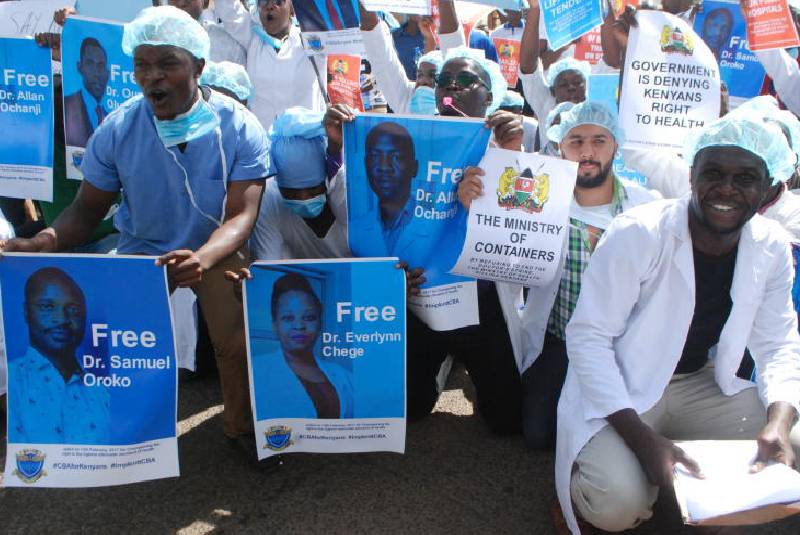
KMPDU members in Kisumu march on Ang'awa Avenue on February 15, 2017. [Photo, Standard]
The 2017 health workers strikes may have caused massive deaths and violated the rights of patients, says a network of doctors.
The Clinical Information Network (CIN) estimates about one million Kenyans may have been denied life-saving hospital admission care during the strikes.
The network says 183,170 patients did not receive admission care in 13 country referral hospitals during the strikes period.
The team of medical doctors and researchers says their data “reasonably mirror the pattern of hospital admissions in other county hospitals.”
“There are 65 similar level referral hospitals in Kenya and we tracked data from 13 of these, suggesting that preventable deaths likely occurred on a massive scale,” says the report.
This would roughly mean some 915,850 patients seeking admission care at the 65 facilities were not attended to and many may have died. Kenya has about 4,000 public health facilities. “This was a violation of people’s rights to healthcare,” says the study led by Prof Grace Irimu of the University of Nairobi.
CIN is a collaboration of 13 county referral hospitals, the Ministry of Health, Kenya Medical Research Institute, the University of Nairobi and Kenya Paediatric Association.
The 13 CIN member country referral facilities are: Machakos, Embu, Kiambu, Kerugoya, Mbagathi, Nyeri, Busia, Kisumu East, Mama Lucy, Kakamega, Karatina, Vihiga and Kitale hospitals.
The network says the strikes culminating to a total of 250 days by doctors and nurses in a span of 11 months and should never be allowed to happen again.
“Health professionals have the right to go on strike, but they crippled health services, violating people’s right to healthcare,” say the medics.
The team had collected two-year admission data from the 13 hospitals covering January 2016 to December 2017, which was within the strikes period.
Data was also collected for a non-strike period covering January 2014 to December 2015 for comparisons. The data covered the four major inpatient disciplines: obstetrics, paediatrics, surgical and adult medicine.
The report shows during the strike 183,170 individuals did not receive admission care in the 13 hospitals.
“This included 59 965 maternity patients, and the same number of newborns, 24,762 medical patients, 20 309 paediatrics and 18,169 surgical patients,” says the report.
The report published in November in the journal BMJ Global Health says although faith-based and private hospitals reported higher attendance during the strike period, many poor Kenyans went without care.
To avoid future loss of lives due to industrial action, CIN wants all parties involved to take responsibility. They suggest plans be put in place to make sure already admitted patients are not thrown out of hospitals during strikes while emergency care is maintained.
The medics, says the strikes raise a moral dilemma with the potential of causing harm to patients, violating professional ethics and the Hippocratic oath.
“Yet, strikes may be justifiable if there is evidence of long-term benefits to doctors, patients and overall quality of care.”
They want the two levels of government to provide better leadership in healthcare to avoid future strikes and loss of lives. During the 2017 doctors’ strike the influential scientific journal, The Lancet had taken a similar stand blaming both doctors and the government for unnecessary patient sufferings.
“Doctors and nurses have a duty of care. That their strikes have cost lives understandably raises concerns about their moral obligations, but the government also has an obligation to resolve this situation immediately,” said The Lancet in an editorial.
In yet another heart-wrenching report published by AIC Kijabe Hospital in April, doctors told of the suffering, horrors and deaths of children and mothers like never seen before during the 100-day doctors’ strike.
At the peak of the strike, a team of 10 doctors at AIC Kijabe Hospital say they had to select babies most likely to benefit from treatment against those with least chance of survival.
They said elective withdrawal of health care, including emergency services, has never been reported anywhere else in the world unless in times of armed conflict or epidemics.
Defending the strikes, the Kenya Medical Practitioners, Pharmacists and Dentists’ Union in August said labour withdrawal was only used as a last resort.
“Doctors went on strike as the last option when dialogue with government authorities was no longer bearing fruits,” said union leaders in the Pan African Medical Journal.
The strikes have also been blamed for a significant drop in child immunisations, exposing Kenyans to a resurgence of diseases such as measles.
By Tuesday, two people had died of measles in Wajir County from139 suspect cases. By Monday, the weekly Outbreaks and Emergency Bulletin of the World Health Organisation showed Kenya to have reported 744 measles cases in six counties since the beginning of 2018.
 The Standard Group Plc is a multi-media organization with investments in media
platforms spanning newspaper print
operations, television, radio broadcasting, digital and online services. The
Standard Group is recognized as a
leading multi-media house in Kenya with a key influence in matters of national
and international interest.
The Standard Group Plc is a multi-media organization with investments in media
platforms spanning newspaper print
operations, television, radio broadcasting, digital and online services. The
Standard Group is recognized as a
leading multi-media house in Kenya with a key influence in matters of national
and international interest.











